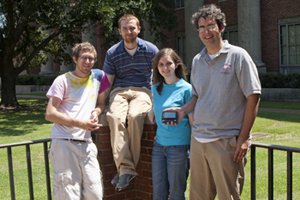(August 24, 2010)
Contact: Rick DelaHaya, Centenary News Services, 318.869.5073
Centenary Students Design Android™ Application; Launch Pherophone
SHREVEPORT, La. (Centenary News Service) —With just a few taps on her cell phone, Centenary College mathematics major Kathryn Hardey can "drop" real time messages from her current position, notifying others of a garage sale, a hot spot for lunch or even a traffic detour all with a mobile application she helped designed.

Members of the Catahoula Coders developed a new application for mobile phones using the Android operating system that allows users to "drop" information about their current location. Team members include (L-R) Jacob Jennings, Nolan Baker, Kathryn Hardey and Dr. Mark Goadrich.
Hardey, a junior from Shreveport majoring in mathematics with a computational concentration, is a part of a group of Centenary students designing apps, a field that is growing with the popularity of "smart phones," with this present app ending up in the Google Android™ market.
Members of the group known as the "Catahoula Coders" developed Pherophone over the summer months, an application that lets its users leave time-sensitive messages at specific GPS coordinates with their phones for others to find. Users can "drop" messages at their current location, letting others know of events, or sniff" out local messages left by other Android™ users. Drops can be highly concentrated of widely dispersed, and travel fast or slow, spreading up to 15 miles per hour.
"Programming mobile applications is a perfect way to teach students to harness the enormous computing power present in their everyday lives," said Dr. Mark Goadrich, assistant professor of computer science and Broyles Eminent Scholars Chair of computational mathematics. "The Android platform in particular is ripe for research into ways to boost the "smarts" of today's smartphones. Unlike Twitter and Facebook, where you follow various people and friends, with Pherophone we wanted to create a way to communicate anonymously based on location, and see what kind of tools we can offer to foster self-organizing behaviors among people as seen in ants, termites and other social insects."
According to Dr. Goadrich, the application is actually modeled after the way insects communicate in the natural world. Using pheromones, ants and other insects organize paths and warn of dangers by a process known as stigmergy. In computer science, this general method has been applied in a variety of techniques called ant colony optimization, which search for solutions to complex problems by depositing "virtual pheromones" along paths that appear promising. This process is now used in artificial intelligence for many optimization problems, with Pherophone taking this decentralized, indirect communication to today's smartphones.
"We set out on a summer adventure to humor Dr. Goadrich's crazed musings," said Jacob Jennings, a junior mathematics and German major with a minor in computer science, and one of the Catahoula Coders. "As the idea came to fruition, we realized he actually wasn't a crazy computer scientist after all; he just really likes ants. With enough people, we could have one sick game of Marco Polo."
Pherophone now enters the application market and is one of more than 70,000 games and applications available according to AndroLib.com, a search engine for Google Android applications. To date, there have been more than 1,000 downloads of the application and used all over the world. The program has also received 4.27 out of 5 stars by users.
Along with Hardey and Jennings, the final member of the "Catahoula Coders" (aptly named for the Catahoula mascot of the College) is Nolan Baker, a senior mathematics major and computer science minor. The group will continue putting their math and computer skills to work, and planning to program with Android in Java for the spring 2011 Data Structures and Algorithms course.
"Working on the Pherophone app was a great learning experience," said Hardey. "It was a fun way to discover the work which goes into creating smartphone apps."
About Centenary College of Louisiana
Centenary College is a private, four-year arts and sciences college affiliated with the United Methodist Church. Founded in 1825, it is the oldest chartered liberal arts college west of the Mississippi River and is accredited by the Southern Association of Colleges and Schools. Centenary is one of 16 colleges and universities constituting the Associated Colleges of the South and has been recognized as "One of the Best 373 Colleges" by the Princeton Review and one of "America's Best Colleges" by Forbes.com. In 2008 Centenary College celebrated 100 years in Shreveport and Bossier City.
